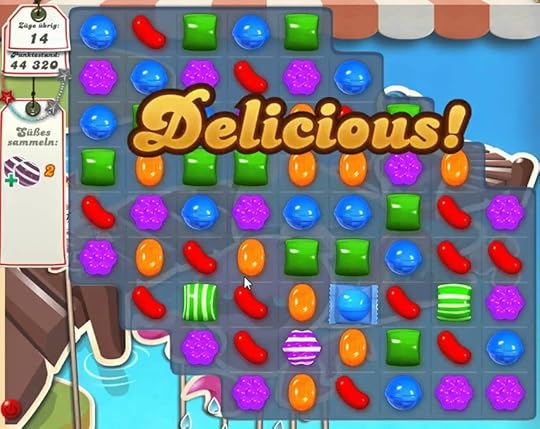Kill Screen Magazine's Blog, page 212
October 12, 2015
Cult classic horror game Pathologic will get an HD remaster before its remake
I’ve only ever met people who love or hate Pathologic. The strange Russian game about a diseased town (to put it simply) won several awards, but English-speaking players criticized it for its poor translation. Its recently crowdfunded remake aims to solve this issue, among other things, but Ice-Pick Lodge has also announced an HD version of the original game that will fix most of what made the original “bad,” while still maintaining what made it good.
Ice-Pick Lodge lovingly refers to this in a blog post as “Pathologic Classic HD: Now Comprehensible.” It’s effectively a remaster of the original game, and not the complete remake their Kickstarter was meant to fund, which is still on the way.
“Change is inevitable,” explains Ice-Pick Lodge. “During the Remake production we’ve found ourselves in quite a conundrum: ideally, we need to reevaluate the old means of expression, make sure that they work, and invent new ones when they don’t. And the ‘means of expression’ aren’t just the graphics or soundtrack, but rather the whole bulk of expressive techniques, from non-core plotlines and character mannerisms to the puns they make; from survival mechanics to soundscape switching solutions.”
"get to know the game that has defined us as a studio"
They continue: "Thus a solution was conceived: to make the original game accessible by fixing the major issues that were disallowing that (compatibility bugs, visual glitches—and the translation, of course). This way, the original Pathologic will always be available to you even if you come to disagree with the changes made in the Remake. And if you haven’t played it at all, you’ll have a chance to get to know the game that has defined us as a studio. We believe this to be a fair compromise."
Pathologic Classic HD has no exact release date yet but should be out before November. You can read more about the team’s decision to remaster the original in their lengthy blog post about it.
Try (and fail) to impersonate a feline and win all the cat dollars in Cat Show
Combat the feline take over by impersonating one in Cat Show
The magical illusions of hocus. reach the zenith of minimalist puzzlers
Staring at the magician's hands.
A virtual reality game about disarming bombs asks how much you trust your friends
Even on the best of days, defusing a bomb is a difficult task. Can there ever really be a "best day" that involves defusing a bomb?
Keep Talking and Nobody Explodes is not interested in simplifying this task. Developed by Ottawa’s Steel Crate Games, it layers wrinkle upon wrinkle, making the task of defusing quite the challenge. You play in a group: one player can see the virtual bomb, the other(s) can see the instruction manual for defusing the damn thing. Everyone has to work together to ensure a satisfactory outcome. For good measure, the clock is ticking, because there’s nothing that fiction likes quite like the ticking time bomb scenario.
In July, Keep Talking and Nobody Explodes was released for Samsung’s Gear VR headset. As with Taphobos, it used the headset to generate an immersive experience (duh!) but also to separate the players. The player looking at the bomb really is in another world and can see things their teammate can’t. This distancing effect may be a more powerful use of VR than the more heavily hyped immersive component.
Keep Talking and Nobody Explodes is now available for any PC users, which raises the question of how well the underlying challenge can work without one player having their face swallowed by a pricey piece of kit. Well, the game remains plenty challenging. As always, its bomb puzzles are procedurally generated, so players are likely to be exploring new ground. Even if they are not completely cut off from one another, they should be sufficiently focused on the task at hand.
more than enough tension to go around.
This approach to suspense has a long history. The tabletop game Battle Ship derived its tension from the fact that each player could not see what the other was looking at. Players competed instead of working together, but the underlying suspense was still a product of what they did not know. More recently, We Are Muësli’s We’ll Meet Again asked two players to work together to solve puzzles using the information on their respective screens. Keep Talking and Nobody Explodes takes one of those screens and replaces it with a manual of sorts. There’s still more than enough tension to go around. Even without VR, any experience can be immersive if it’s sufficiently compelling. Defusing a bomb sure passes that test.
Shut up, The Beginner���s Guide
If you do not like The Beginner’s Guide, we have the review for you.
Allison Road ventures into the woods with its latest horrifying reveals
The world outside Allison Road’s iconic house setting is even stranger and more dangerous than what’s previously been revealed.
New concept art for the upcoming horror game shows off an eerie forest setting, a moss-covered wood in the shadow of a looming mountain and overlooking a grey lake. In one image, an old dock juts out over a bottomless void. A figure kneels on the dock near a small rowboat, which hovers above the empty lake as if all is still well.
Both the dock and the lake do look normal in the image before it, which makes me wonder if Allison Road is set across alternate dimensions, similar to Silent Hill’s iconic “otherworld.”

Allison Road’s project lead, Chris Kesler, provided a bit more insight about this new setting in an interview with IGN.
A girl in a bloody dress gazes up
“The exterior environments (for example the forest) actually have a very intricate connection to Allison Road's story that we think will be really fun to piece together,” Kesler explained. “The story just really lends itself to be told in contrasting settings and what better way to perceptually open up the quite confined space of the house, than to set it in a proper outdoor environment?
“We think it'll be quite interesting,” Kesler added. “When you are in the house all you want is to get out; when you are out all you want is to get back into the 'safety' of the house.”

Only the inside of the house has been shown off in Allison Road videos so far, but the new concept art also hints at some of the horrors that might be found outside it. Take, for instance, this hellish interpretation of the Capitoline Wolf, carved from a rotted tree trunk and bearing a tangle of antlers on its snarling head. A girl in a bloody dress gazes up at it from the bottom of the stump. It’s unclear whether this is Lily, the game’s main ghost girl, or a new character entirely.
Speaking of new characters, the creators have also uploaded some high-def images of one named Hana. She’s an incredibly gruesome sight, tied up in an intricate rope harness and stained with blood. You’ll have to go to Allison Road’s Kickstarter page to see that one.
WORLDS COLLIDE: On Tony Hawk's Pro Skater 2 and Style in skateboarding
The legacy of Tony Hawk videogames, in skateboarding and open worlds.
October 9, 2015
China is counting videogame purchases against your credit score
The Chinese government, with the assistance of national internet oligopolists Alibaba and Tencent, is in the process of introducing a new form of credit score that will factor in political compliance, the actions of one’s acquaintances, and the products one chooses to buy. Under this scheme, buying videogames is a surefire way of lowering your credit score.
That’s right: A Chinese national who purchased The Witcher 3 will have a harder time getting a loan.
The credit score ostensibly exists to simplify the task of deciding who should receive money from financial institutions and at what rate. Based on a series of inputs, it presents an individual’s likelihood of paying back their creditors as a single number. If you want anything—a house, a car, a bridging loan when you lose your job—you will benefit from having a good credit score. And that’s why the credit score is more than a dispassionate snapshot of your financial prospects; it is a target that can shape your behaviors. This is not always a problem. Bettering your credit score can involve such reasonable practices as paying bills on time and lowering your debt burden. At the margin, however, the importance of a good credit score can encourage behaviors that have no real financial value.
credit scores can encourage behaviors that have no real financial value
The most generous interpretation of China’s new credit score is that there’s some heretofore-unknown connection between creditworthiness and gaming. Maybe all Halo players really are louts after all! Just don’t bet it. There is no reason to believe this new credit score system is an act of good faith. Any credit score that counts the voicing of political opinions without prior approval against a citizen is clearly prioritizing behavior modification over sound economic reasoning. There is a clear threat implicit in this credit score calculus: Any behavior that the government finds undesirable could result in one’s access to credit being cut off, and as John Lanchester rightly notes in I.O.U., his masterful survey of the credit crunch, credit underpins the entirety of modern finances and life. If you want anything, then, the Chinese government is telling you to get in line.
The new Chinese system is clearly extreme but it would be a mistake to view it as an outlier. “China’s nightmarish Citizen Scores are a warning for Americans,” writes the ACLU’s Jay Stanley. He argues that fears about this sort of abuse of big data are too often dismissed as merely theoretical. This claim is echoed by Computerworld’s Darlene Storm, who points out that Chinese citizens can already track their new credit scores on an app called Sesame Credit. The system doesn’t come into effect until 2020 but it will likely have an early effect on citizens’ choices. This is the most chilling version of the phrase “building a credit history.”

Sesame Credit’s may look familiar to the American viewer, and with good reason. It has basically the same interface as Credit Karma, a free app with 75,000 ratings across its many versions in iTunes. (Download data is not publicly available.)

Credit Karma doesn’t encourage you to give up gaming or political speech, but that’s only because those are not variables in the FICO score model, which has been used to calculate American credit ratings since 1989. If tomorrow morning America’s three credit bureaus, Experian, Equifax, and TransUnion, were to give in to a fit of madness and declare the purchase of games a credit risk, Credit Karma would become Sesame Credit. For now, America’s various credit score apps are still trafficking in a similar form of gamification. Indeed, while China has pioneered the inclusion of gaming in credit scores, perfecting one’s score has always been something of a game.
One of the factors in a FICO score is an individual’s credit history: past payment of debts is used as a predictor of future payment. If you want to maximize your FICO score, then, it makes sense to buy things on credit and pay them off on schedule. There is no reward for paying off your debts early, even if that’s often a sound decision. In fact, credit scores discourage paying for your purchases in cash, even though that’s often a good idea if you have the means. This is why your credit score is conceivably better than Warren Buffet’s. Buffet is obviously the likelier bet to pay off a $10,000 loan, but a simplistic model that depends on credit history cannot know that. In that way, credit scores can encourage actions that have no intrinsic value. Credit Karma, like Candy Crush, is all about grinding.

The similarities between China’s new credit score and American credit ratings don’t end there. In August, it was revealed that Facebook had filed a patent on a system for using social networks to determine creditworthiness. “If the average credit rating of these members is at least a minimum credit score, the lender continues to process the loan application,” the patent explained. “Otherwise, the loan application is rejected.” Facebook’s patent has yet to be put to use, but it is nonetheless concerning. Would you cut ties with friends to improve your chances of home ownership? A number of payments startups, including Affirm and LendUp, are attempting to use social media data to glean creditworthiness. The Wall Street Journal's Douglas Macmillan reports: "Even Fair Isaac, which provides the FICO scores used in more than 90% of lenders decisions, says it is weighing possibilities for incorporating social media."
Make no mistake; credit bureaus would integrate game purchases into their calculations in a heartbeat if they had a way to measure this data and a reason to believe it reflected one’s ability to repay debts. That is not why China is factoring game purchases into its new credit scores, but it is the outcome citizens of other nations ought fear most. Games are repositories of data about human behavior and choices, and at some point a financial institution will try to put this data to use. Here’s hoping The Beginner’s Guide speaks well for us all.
GIF GJ is a Frankenstein's monster of millennial internet culture
I think it's time we accept that the GIF has become our symbol for this moment in the digital age. Fleeting, repetitive, ephemeral and yet always the same, the GIF captures the essence of a generation built on the internet: a never-ending loop of recycled information spreading on and on and on, ad infinitum.
Giphy's GIF GJ feels like the chaotic logical conclusion to millennial remix culture. Deriving from the cult of the mashup, GIF GJ combines digital DJing with GIFs by replacing a musical playlist with a soundboard of animated graphics. According to Giphy, the software is a call to all "self-acclaimed party DJs, music lovers, and playlist-making royalty" because "your day and your grooves, just got better."
the chaotic logical conclusion of millennial remix culture
After picking your favorite "groove" you want to DJ alongside, you can then choose from one of several themed GIF playlists. From "cat party" to "trippy feels," each letter on your keyboard transforms into a different GIF, while the spacebar is supposed to help control the tempo. As Giphy explains, you can pick any kind of music you want to overlay on top of the animated images, even "if metal is more your flavor, just throw on Megadeth’s 'Symphony of Destruction' and set it to a cute compilation of fuzzy cats—just do you." Yes, I'll "do me," expressing myself creatively by pressing designated keys which play GIFs that other people made.
Interestingly, in the "throwback" playlist, one GIF features footage of someone (almost sexually) inserting a cartridge into an Atari, demonstrating a commonality between GIF and gaming culture, both preferring a warm stew of superficial nostalgia over any sort of new content.
"We’re always trying to make that GIF experience 100%" says Giphy, as if those words mean anything whatsoever. "Music tops the list of 'things that make us feel good.' And you deserve an experience curated just for you."
Do we, Giphy? Do we really?
You can get lost in the wormhole of millennial remix culture with the Beta for GIF GJ here.
///
Kill Screen Magazine's Blog
- Kill Screen Magazine's profile
- 4 followers



